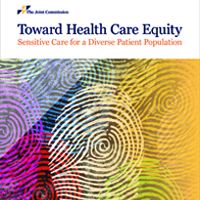The Importance of Equity in Health Care
Maternal mortality rate for Black women is 4x higher than that for non-Hispanic White women
Hispanic women are 20 percent more likely to die from cervical cancer than non-Hispanic White women
Asian Americans are eight times more likely to die from hepatitis B than non-Hispanic Whites
Diabetes rates are more than 30 percent higher among Native Americans and Latinos than among Whites
People often view health care equity through the lens of social injustice, but it’s first and foremost a quality-of-care problem. That’s why we need to approach it the same way we approach other patient safety priorities — like medication errors and health care-acquired infections, for example. This means understanding the root causes of health care equity issues and addressing them with targeted interventions.
After all, every person deserves an opportunity to live their best — and healthiest — life.
So, how can Joint Commission Resources (JCR) help you improve health care equity at your organization? By doing what we do best. We encourage health care providers to raise the bar for the populations they serve. We help you meet standards and make necessary improvements.
Our expert services and solutions can help you:
The accreditation standards focus on existing areas known to be essential to advancing equity, including data collection, leadership and governance, and individual rights and responsibilities. Examples include:
- Changes to leadership requirements
- Records requirements when collecting patient race and ethnicity information
- Rights and responsibilities requirements prohibiting discrimination
*The use of Joint Commission Resources consultative technical or advisory services is not necessary to obtain a Joint Commission Accreditation award, nor does it influence the granting of such awards.





